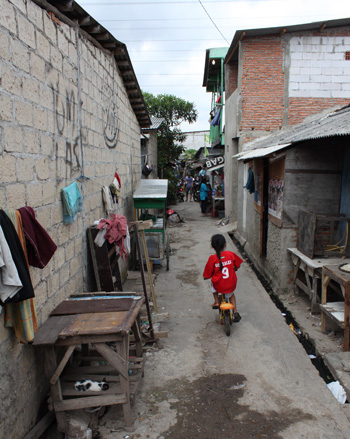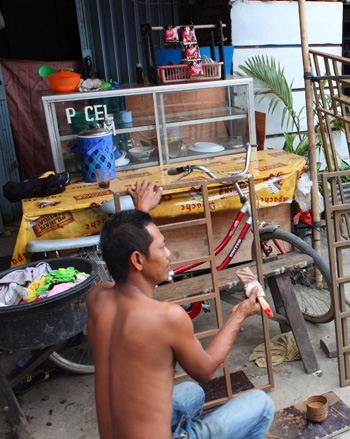Illegal squatters in Jakarta struggle for recognition of their homes and livelihoods
Lukas Ley
The inhabitants of Bongkaran provide a cheap labour forceLukas Ley |
Ariel is a squatter. When we met in Pademangan Timur, a sub-district of North Jakarta, I asked her if this was where she lived. ‘Yes,’ she replied with a nervous laugh, ‘but I’m actually here illegally. I’m officially registered in the legal area, but my house is over there.’ She pointed in the direction of an area commonly called Bongkaran. Today this poor neighbourhood is home to approximately 2000 people, families of both long-time city dwellers and recent immigrants.
Declaring that they live in the sub-district where they are registered is a common way for illegal squatters to circumvent government regulations. Despite what many people think, most squatters are not illegal immigrants, but people who have been living in Jakarta for decades or even generations. Upheavals in Jakarta's poor neighbourhoods mean that their inhabitants often have to move on, looking for somewhere to live where they can still get to their places of employment. In fact, the name Bongkaran derives from the Indonesian word bongkar, which means take apart or uproot. The name alludes to the place's origins, but it also foreshadows its future destruction.
Localised self-government
Bongkaran, which covers an area of approximately 4 hectares, emerged on land which is subject to a total ban on construction of any kind. Twelve years ago the government razed all the houses there, and ever since then all human activity within its boundaries has been officially prohibited. The only building to escape the bulldozers was the mosque, which still stands on the site like a sacred sign of resistance against rationalist urban politics.
The swampland on which Bongkaran stands was reclaimed by Suharto's government because it stood in the way of a road designed to connect the new elite neighbourhood of Kota Baru Kemayoran to the inner-city toll road and Jakarta's international airport. When the Jakarta real estate bubble suddenly burst in the wake of the Asian financial crisis of the late 1990s, infrastructure projects of this type were abandoned, and the vacant land soon attracted small-scale peasants and fishers, who made use of swampy borders of the toll road ramp to farm fish.
Ferus, one of the first settlers and current head of a neighbourhood association, described the neighbourhood’s origins: ‘In the beginning we didn't bother to build houses on the land because we weren't allowed to,’ he said. ‘But step by step people settled next to the plots of land they were farming. Then they took some more land and stayed. I was one of the first settlers.’ Ferus knows the neighbourhood intimately, and he still has some old black and white photographs that show the first settlements. To extend their land, the newcomers filled the swamp with garbage. Practically all the houses in Bongkaran stand on this thick layer of rubbish.
Ferus is one of the six informal village heads in Bongkaran. In contrast to formally organised and governed neighbourhoods elsewhere in Jakarta, the village heads in Bongkaran have not been nominated by the local population. Instead they appointed themselves to the position. In the twelve years of the squat's history, Ferus has played an important role: at the moment, he controls an informal tax system which he runs with the help of gangsters believed to have mysterious powers and who work on and off for powerful, city-wide organisations. The tax is used to improve the squat's infrastructure, such as its streets and power supply.
Two years ago, the water company AETRA made a donation to the sub-district of Pademangan Timur, providing certain neighbourhoods with new water pumps to make them independent of the exorbitant market price of fresh water. Now Ferus runs the water extraction system with the help of the Betawi Brotherhood (FBR), a strong civil organisation representing and protecting the interests of the Betawi people, as the long-time inhabitants of Jakarta are called. Ferus proudly numbers himself among the membership of the Brotherhood, despite his Madurese ethnicity.
Ferus believes that it is important to care for the well-being of his community. He regrets that the state does not feel responsible for Bongkaran and he legitimates his claim to leadership as something crucial to the preservation of peace and order in his neighbourhood. In the absence of any formal state authority to keep the peace, he says, some inhabitants used to resort to self-administered justice – even when it sometimes resulted in beatings and even extra-judicial killings.
Claiming recognition
Other residents also deplore the situation in Bongkaran. They feel neglected and excluded by the government, especially those who have lived there for many years and built permanent dwellings on the land. They have contributed to the squat's development by investing money and labour in their surroundings, and feel they have a legitimate claim to government recognition. They have lobbied for legalisation of the settlement, but their demands are regularly denied at all government levels.
Sasqi and her husband, a construction worker, are raising four young children in Bongkaran. She is a vigilant observer of the living conditions in the neighbourhood and is well known among the community. She manages a small school, teaching English and Arabic to children between the ages of three and twelve. Sasqi has fought relentlessly to get legal recognition for her house. She has drafted petitions, talked to officials and involved herself in protests organised by local and international NGOs. She justifies her claim to legal status by emphasising her efforts as an engaged member of society.
Granting recognition to Bongkaran's residents would make them official citizens of the sub-district, giving them fundamental rights such as the right to vote and access to programs of state welfare. Yet a proposal Sasqi and other inhabitants of the kampung drafted and submitted to the local district head was summarily declined, and now she doubts that their claims will ever be taken seriously. In the end, she says with a sigh, they might all just have to accept displacement. In the meantime, however, she presses on with her claim for legal status, something she considers crucial for both her children and her teaching career.
Sasqi has often heard rumours about a government plan to provide social housing for the residents of Bongkaran in a subsidised apartment complex to be built by the state housing authority PT Perumnas. If this happened, she says, she would willingly give up her house and move into one of the apartments: ‘To me, it doesn't matter what kind of accommodation they offer us. If it’s free, we’ll take it!’ Sasqi expects the government to take care of poor communities, whatever the legal status of the land where they live.
One of Sasqi’s allies is Iwan, who openly calls himself an activist. He has been living in Bongkaran for more than seven years. He bought land there from someone who provided him with legal documents to the land, hoping that it would be a safe place to raise his children. However, the documents turned out to be false, and his small house, barely big enough for himself, his mother and his two daughters, is actually located on state-owned land. So Iwan has no legal basis to claim compensation if the state wants him and his family out. He is indignant at being considered an illegal resident, but he faces his situation with humour: ‘My house isn't legal. Who cares? Everyone here is illegal. But we still have to pay tax. If we don't, we can expect a visit from the preman.’
Iwan has worked constantly with foreign and local civil rights organisations in an effort to achieve better living conditions and recognition of Bongkaran as a neighbourhood. NGO activities have dropped off in the last two years but Iwan keeps up his activism, making his opinion of the government clear with his printed t-shirts that carry slogans like ‘Stop lying to the people!’ He has built networks with activists in other squats, and together they often organise protests and meet with officials. To him, these collective acts prove that even illegal residents can do something about the city’s problems.
 |
Cycling through one of the countless alleys of BongkaranLukas Ley |
The struggle continues
Like Ariel, Sasqi and Iwan, many people continue to lead shadowy lives in Bongkaran. They are not complete outcasts in the city – in fact they have been quite successful in integrating themselves into the city’s economy and at times they are politically significant actors – but they remain excluded from government programs and access to social security. The stigma attached to their place of residence means they often have to resort to illegal acts like bribery and fraud to deal with everyday life.
Bongkaran has many problems, among which are insufficient waste management and organised crime. Localised self-government as a substitute for state authority sometimes produces viable solutions, but the residents have no access to the political and economic resources available at the district level if they want to solve problems in their community. And the city's urban development policies still have the potential to randomly uproot and destroy communities like Bongkaran, even as they struggle to insert their hardworking members and services into the city's still-diverse economy.
North Jakarta is changing rapidly. Investors are impatient to develop more land. The current city governor, Fauzi Bowo, promotes aggressive zoning and land rehabilitation programs. Bongkaran's residents are therefore bound to experience strong pressure from authorities anxious to make more productive use of government-owned land and exercise tighter control over its property. The heads of legal neighbourhoods bordering Bongkaran are aware of these pressures. In stepping up their own land regulation efforts, they further disengage from the illegal neighbourhood, which they consider a lost cause.
There is hope, however, that some residents could benefit from Jakarta's increasing commitment to state-subsidised housing and homeownership programs, or at least receive compensation for losing their property and homes. The outcome might depend on the extent to which Bongkaran's emblematic and powerful figures can unite residents behind a common project, and emphasise the neighbourhood's social and economic importance for the region.
Lukas Ley (to.lukasley@googlemail.com) is a PhD student in Social Anthropology at the Ecole Des Hautes Etudes en Sciences Sociales in Paris.



